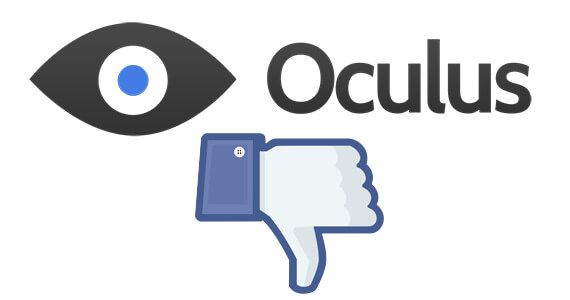At E3 2013 last summer the tech that blew us away had nothing to do with the next-gen consoles from Microsoft and Sony, it was a prototype virtual reality headset from Oculus VR. We had gotten hands-on with the Oculus Rift while playing EVE-VR (now EVE: Valkyrie) and it forever changed us. This new type of virtual reality worked, and worked wonderfully. It was truly what next-gen gaming would become.
The buzz rippled throughout the video game industry from trade show to trade show, all the while, more and more devs pledged their support to the platform. Developers and fans continued to mod older games to let them work with the Oculus Rift VR headset, from Nintendo classics like Legend of Zelda and Mario Kart to Valve's lineup of games (Portal, Half-Life 2, etc.) to the upcoming Doom 4 and EverQuest Next.
The Oculus VR tech first made a splash when it took to Kickstarter in late 2012 with several video game developer celebrities appearing in its pitch video as backers and supporters of the tech. The company wanted to raise $250,000 and they actually got 10x that. Now it was real. Just over a year later and the company had earned several rounds of additional multi-million dollar investment to fast-track the technology's release to the consumer market, all the while, Sony and Microsoft were reportedly developing their own rival VR Headsets.
And not a week after Sony unveils their own tech, Project Morpheus, at GDC that Facebook officially announces the acquisition of Oculus VR for a whopping $2 billion. Everyone who owned stock at Oculus VR is now super rich. Everyone who jumped up first to back the tech via Kickstarter get... absolutely nothing. And the response? Well, you can just by some of the comments on social media and in our own article on the Facebook-Oculus acquisition here. There are some nasty comments on the actual Oculus Rift Kickstarter page from backers as well. A lot of interested gamers aren't too happy about the mega-corporate entity scooping up the relatively small tech-forward company.
For backers, who are essentially just donating money to a Kickstarter project either for good will or a specific tier reward, they didn't offer their own money towards Oculus Rift so they can sellout to Facebook, and that's where some of the controversy stems from. Markus "Notch" Persson, creator of Minecraft and top-level supporter of the Oculus Rift Kickstarter (for $10,000) isn't happy either. In fact, he's no longer going to work with them because he has problems with what he dubs the "creepy" Facebook.
On a personal blog entry, Notch writes on why the Facebook-owned Oculus isn't for him:
Facebook is not a company of grass-roots tech enthusiasts. Facebook is not a game tech company. Facebook has a history of caring about building user numbers, and nothing but building user numbers. People have made games for Facebook platforms before, and while it worked great for a while, they were stuck in a very unfortunate position when Facebook eventually changed the platform to better fit the social experience they were trying to build.
He holds no ill will towards the team behind Oculus:
I have the greatest respect for the talented engineers and developers at Oculus. It’s been a long time since I met a more dedicated and talented group of people. I understand this is purely a business deal, and I’d like to congratulate both Facebook and the Oculus owners. But this is where we part ways.
While backers might be upset about Oculus Rift becoming a department of Facebook, or that post-Kickstarter investors are earning a 20-fold return on their investments, Kickstarter has never been about giving equity to backers. Perhaps after seeing the quick success of this particular project, potential backers will be more conscious of that fact going forward. It is a shame that the earliest supports, those who stepped up first, get nothing from the acquisition, while the big-money investors Spark Partners and hedge fund Matrix Partners who invested $19 million each, now have $380 million each. The rich get richer, as they say.
From the Oculus VR team:
This partnership is one of the most important moments for virtual reality: it gives us the best shot at truly changing the world. It opens doors to new opportunities and partnerships, reduces risk on the manufacturing and work capital side, allows us to publish more made-for-VR content, and lets us focus on what we do best: solving hard engineering challenges and delivering the future of VR.
Over the next 10 years, virtual reality will become ubiquitous, affordable, and transformative, and it begins with a truly next-generation gaming experience. This partnership ensures that the Oculus platform is coming, and that it’s going to change gaming forever.
The real question is how the acquisition will affect the Oculus Rift's road to the consumer market. Will it release sooner and for a cheaper price? With the big corporate backing, does this put Sony and Microsofts own VR headsets in a tougher spot to compete? Will Oculus Rift remain PC only? What sort of social experiences can we expect from the tech?
_____
Follow Rob on Twitter @rob_keyes.

